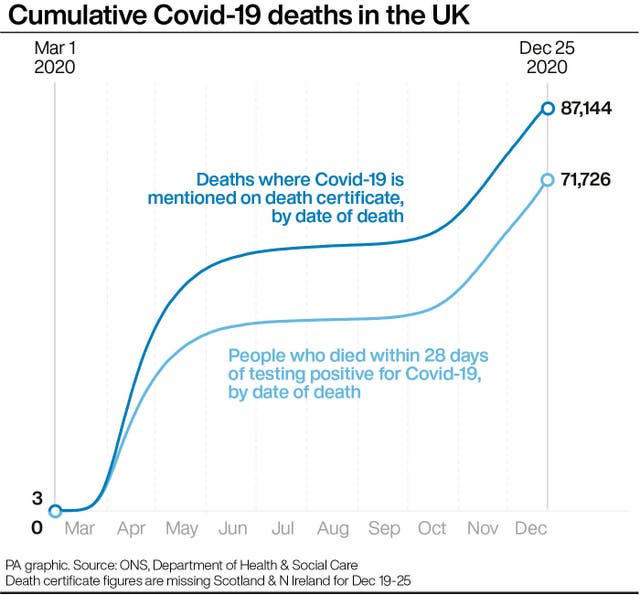Johnson: Emergence from lockdown will be gradual unwrapping of restrictions
Boris Johnson said there was now a sprint between efforts to vaccinate the vulnerable and the spread of coronavirus.

Boris Johnson warned it would take time to ease lockdown restrictions in England which could be in place until the end of March.
The Prime Minister said there was “no choice” but to issue the stay-at-home order and close schools given the spread of coronavirus, particularly the more infectious new variant.
Addressing MPs after the recall of the Commons from its Christmas break, Mr Johnson said there was now a race between the spread of the virus and the delivery of vaccines to the most vulnerable.
England’s lockdown has already come into force and MPs will vote later to retrospectively approve it.
Mr Johnson said: “Our emergence from the lockdown cocoon will not be a big bang but a gradual unwrapping.
“That is why the legislation this House will vote on later today runs until March 31 – not because we expect the full national lockdown to continue until then but to allow a steady, controlled and evidence-led move down through the tiers on a regional basis.”
The Prime Minister told MPs there would be “continuous review” of the measures with a statutory requirement to look at them every fortnight and a legal obligation to remove them if they are no longer necessary.

“We are in a tough final stretch, made only tougher by the new variant,” Mr Johnson said.
“After the marathon of last year we are indeed now in a sprint, a race to vaccinate the vulnerable faster than the virus can reach them.
“Every needle in every arm makes a difference.”
Despite calls from Speaker Sir Lindsay Hoyle to stay away from the Chamber and participate remotely, the Conservative benches were well attended.
Mr Johnson believes the rollout of vaccines will provide a route out of lockdown, but his approach was questioned by the World Health Organisation (WHO).
The Government is giving the vaccine to as many priority patients as possible with a second shot after 12 weeks, rather than holding back supplies to offer the booster dose three weeks after the first jab.

The WHO said it would not recommend that approach, instead suggesting the interval should be between three and four weeks.
Vaccines minister Nadhim Zahawi said the Government had a “stretching” target of vaccinating 14 million people in the highest priority groups – the elderly, those with clinical needs, care home residents and staff and frontline NHS workers – by February 15.
Some 1.3 million people have already received either the Pfizer/BioNTech or Oxford/AstraZeneca jab.
The Government wants England’s schools to reopen after the February half-term starting that week, but experts warned that would depend on progress in the battle to curb Covid-19 cases.
GCSE and A-level examinations in England will not take place as a result of the disruption.
The Prime Minister faces pressure from some Conservatives to ease the lockdown as soon as possible.
Former chief whip Mark Harper, chairman of the Covid Recovery Group (CRG) of lockdown sceptics, used a Telegraph article to call for a “substantial relaxation” of restrictions as soon as the four top priority groups have been vaccinated.
Fellow CRG member Steve Baker said: “Once the most vulnerable have been vaccinated, draconian restrictions must be substantially removed.”
Sir Graham Brady, chairman of the influential 1922 Committee of backbench Tories, called for Commons votes at the end of January and February on whether the restrictions should continue.
Mr Johnson told MPs there would be “substantial opportunities for relaxing the restrictions” before the end of March.
In other developments:
– One in four deaths in England and Wales registered in the week leading up to Christmas – some 2,912 – involved coronavirus Office for National Statistics (ONS) figures showed.
– The Metropolitan Police indicated a tougher approach to those flouting the lockdown, with officers expected to be more “inquisitive” about why people are “out and about”.
– The European Medicines Agency cleared the way for the Moderna vaccine to be used in the European Union, but following the end of the Brexit transition period on December 31 this will not apply in the UK.
England’s lockdown measures will be approved by MPs despite some reservations on the Tory benches.
Labour leader Sir Keir Starmer backed the restrictions, saying: “The virus is out of control, over a million people in England now have Covid, the number of hospital admissions is rising, tragically so are the numbers of people dying.
“And it’s only the early days of January and the NHS is under huge strain. In those circumstances, tougher restrictions are necessary.”

But he added “this is not just bad luck, it’s not inevitable, it follows a pattern” of the Government being slow to respond.
England’s chief medical officer Professor Chris Whitty has warned some restrictions may have to be introduced again next winter.
Graham Medley, professor of infectious disease modelling at the London School of Hygiene and Tropical Medicine, and a member of the Scientific Advisory Group for Emergencies (Sage), agreed and said “we’re in for a long haul” in the fight with coronavirus.
He told BBC Radio 4’s Today: “Vaccination is a way out, but I think he’s right to raise that possibility that there could be – next winter or even the winter after – the possibility that we will see a resurgence of Covid to such an extent that Government again has to take measures to prevent another large outbreak.”





